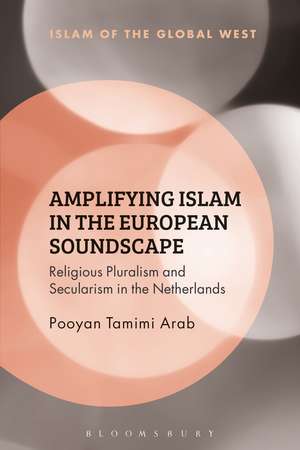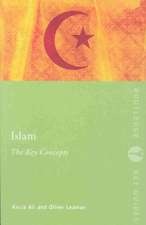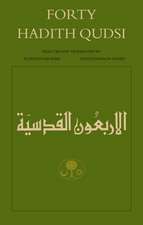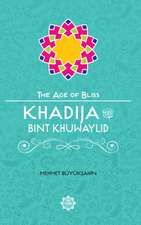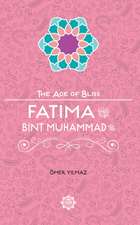Amplifying Islam in the European Soundscape: Religious Pluralism and Secularism in the Netherlands: Islam of the Global West
Autor Pooyan Tamimi Araben Limba Engleză Paperback – 22 aug 2018
| Toate formatele și edițiile | Preț | Express |
|---|---|---|
| Paperback (1) | 236.54 lei 6-8 săpt. | |
| Bloomsbury Publishing – 22 aug 2018 | 236.54 lei 6-8 săpt. | |
| Hardback (1) | 772.58 lei 6-8 săpt. | |
| Bloomsbury Publishing – 8 feb 2017 | 772.58 lei 6-8 săpt. |
Preț: 236.54 lei
Preț vechi: 305.12 lei
-22% Nou
Puncte Express: 355
Preț estimativ în valută:
45.27€ • 47.09$ • 37.37£
45.27€ • 47.09$ • 37.37£
Carte tipărită la comandă
Livrare economică 15-29 aprilie
Preluare comenzi: 021 569.72.76
Specificații
ISBN-13: 9781350081185
ISBN-10: 1350081183
Pagini: 216
Dimensiuni: 156 x 234 mm
Greutate: 0.3 kg
Ediția:NIPPOD
Editura: Bloomsbury Publishing
Colecția Bloomsbury Academic
Seria Islam of the Global West
Locul publicării:London, United Kingdom
ISBN-10: 1350081183
Pagini: 216
Dimensiuni: 156 x 234 mm
Greutate: 0.3 kg
Ediția:NIPPOD
Editura: Bloomsbury Publishing
Colecția Bloomsbury Academic
Seria Islam of the Global West
Locul publicării:London, United Kingdom
Caracteristici
The analysis of the Dutch religious soundscape offers an original ethnographic description of current debates around the place of Islam in the Global West
Notă biografică
Pooyan Tamimi Arab is Assistant Professor at the Department of Philosophy and Religious Studies at Utrecht University, the Netherlands.
Cuprins
List of FiguresAcknowledgementsIntroduction1. 'A Minaret of Light': Transducing the Azan?2. A History of Public Worship: From Procession Prohibition to Amplified Azan3. Conflicting Secularisms: Nativism and the Constitutional Protection of the Azan4. Regulating Nostalgias: Azan Negotiations in a Dutch TownEpilogueNotesBibliographyIndex
Recenzii
[Arab's] richly textured and concise book deserves to be read by everyone concerned with Islam and the emerging legal landscape of Western Europe.
The openness with which Tamimi Arab presents his research, methodology and data is refreshing. This book presents extensive historical backgrounds, such as an account of Catholic processions in the nineteenth century and a vivid account of Dutch migration history. It also extensively documents the constitutional evolvement of sonic religious expression and reflects on an alternative, visual azan that uses light instead of sound. As such, Amplifying Islam in the European Soundscape is not merely the empirical study of a phenomenon that is relatively new to the Netherlands, but it is also a rich document that contributes to the study of secularism and religious pluralism in the Netherlands.
This is a book with a great sense of urgency. Written in a lucid, personal style, and drawing on insights from cultural anthropology, political philosophy, material religion studies, and art history, Pooyan Tamimi Arab offers a highly original, truly interdisciplinary contribution to our understanding of European secularism and religious aesthetics. This book will be essential reading for everybody interested in how Islam gradually but surely becomes an established religion in Europe.
This is one of the most important books on Islam in Europe in the recent years. The author convincingly shows that amplifying Islam have become part of the 'politics of home', in which the native Dutch - defining themselves as secular- barely support equal treatment of religions in the public space. The author -always subtle, never judgmental- shows the deep ambivalences of today's secular Europe; the embarrassment of non-believers.
Pooyan Tamimi Arab gives us a fine, detailed and sophisticated account of Dutch local and national debates over the advent of Islamic sound in public space, a development that tests tolerance still more acutely than does visual Islam.
Religious pluralism is hard to accept when religion is largely a matter of belief but it is harder when it is predominately constituted by public practice. Pooyan Tamimi Arab's outstanding book shows just why this is so even in societies that espouse liberal values and toleration. Original and provocative, moving effortlessly from European philosophy to Islamic traditions, this book emphasises the sonic and audible dimensions of religion and opens up new possibilities of research on religion and the public sphere
In Amplifying Islam in the European Soundscape, Dutch anthropologist Pooyan Tamimi Arab takes Dutch debates concerning the azan as a starting point for an ethnographically informed exploration of what constitutional secularism looks like in practice ... Having myself, like John Bowen and Akeel Bilgrami, called for ethnographic accounts of secularism and the secular in practice that do not reduce them to an exclusively Western phenomenon inherently antagonistic to Islam and Muslim minorities in the West, I am deeply sympathetic to the ambitions in Tamimi Arab's work. As he emphasizes, we need to "learn from actual secular states how they deal with religious pluralism.
Tamimi Arab's study of the azan in the Netherlands helped me understand the contribution of everyday aesthetics to migrant religious communities feeling 'at home' in their adopted country. It provides a thoughtful contribution to debates about the governance of religious diversity and the role of constitutional secularism.
The openness with which Tamimi Arab presents his research, methodology and data is refreshing. This book presents extensive historical backgrounds, such as an account of Catholic processions in the nineteenth century and a vivid account of Dutch migration history. It also extensively documents the constitutional evolvement of sonic religious expression and reflects on an alternative, visual azan that uses light instead of sound. As such, Amplifying Islam in the European Soundscape is not merely the empirical study of a phenomenon that is relatively new to the Netherlands, but it is also a rich document that contributes to the study of secularism and religious pluralism in the Netherlands.
This is a book with a great sense of urgency. Written in a lucid, personal style, and drawing on insights from cultural anthropology, political philosophy, material religion studies, and art history, Pooyan Tamimi Arab offers a highly original, truly interdisciplinary contribution to our understanding of European secularism and religious aesthetics. This book will be essential reading for everybody interested in how Islam gradually but surely becomes an established religion in Europe.
This is one of the most important books on Islam in Europe in the recent years. The author convincingly shows that amplifying Islam have become part of the 'politics of home', in which the native Dutch - defining themselves as secular- barely support equal treatment of religions in the public space. The author -always subtle, never judgmental- shows the deep ambivalences of today's secular Europe; the embarrassment of non-believers.
Pooyan Tamimi Arab gives us a fine, detailed and sophisticated account of Dutch local and national debates over the advent of Islamic sound in public space, a development that tests tolerance still more acutely than does visual Islam.
Religious pluralism is hard to accept when religion is largely a matter of belief but it is harder when it is predominately constituted by public practice. Pooyan Tamimi Arab's outstanding book shows just why this is so even in societies that espouse liberal values and toleration. Original and provocative, moving effortlessly from European philosophy to Islamic traditions, this book emphasises the sonic and audible dimensions of religion and opens up new possibilities of research on religion and the public sphere
In Amplifying Islam in the European Soundscape, Dutch anthropologist Pooyan Tamimi Arab takes Dutch debates concerning the azan as a starting point for an ethnographically informed exploration of what constitutional secularism looks like in practice ... Having myself, like John Bowen and Akeel Bilgrami, called for ethnographic accounts of secularism and the secular in practice that do not reduce them to an exclusively Western phenomenon inherently antagonistic to Islam and Muslim minorities in the West, I am deeply sympathetic to the ambitions in Tamimi Arab's work. As he emphasizes, we need to "learn from actual secular states how they deal with religious pluralism.
Tamimi Arab's study of the azan in the Netherlands helped me understand the contribution of everyday aesthetics to migrant religious communities feeling 'at home' in their adopted country. It provides a thoughtful contribution to debates about the governance of religious diversity and the role of constitutional secularism.
